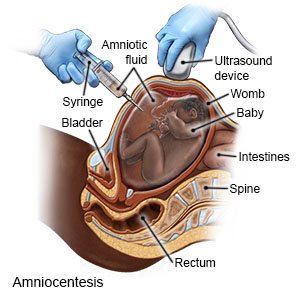Placenta Previa
Medically reviewed by Drugs.com. Last updated on Aug 4, 2025.
AMBULATORY CARE:
Placenta previa
is a condition that causes your placenta to grow near or completely over the opening to your cervix. It can also be called a low-lying placenta. The placenta supplies the baby with nutrients and oxygen during your pregnancy. It also takes away waste produced by your baby. Normally the placenta grows either on the side or top of your uterus (womb). If your placenta grows too near your cervix, it could grow completely over it and block the opening to your vagina. This may cause vaginal bleeding that is harmful to you and your baby.
Common signs and symptoms of placenta previa:
- Bleeding a small amount (spotting) or a large amount, usually late in the second trimester
- Contractions
Call your local emergency number (911 in the US) if:
- You have chest pain when you take a deep breath or cough.
- You cough up blood.
- You suddenly feel lightheaded and short of breath.
- You have any amount of bleeding from your vagina.
- You are having severe abdominal pain or contractions.
Seek immediate care if:
- You feel faint or too weak to stand up.
Related medications
Call your doctor or obstetrician if:
- You feel abdominal cramps, pressure, or tightening.
- Your heart is beating faster than normal for you.
- You have questions or concerns about your condition or care.
Treatment:
Placenta previa may go away later in your pregnancy, and you may not need treatment. Your placenta may move when your uterus changes shape as you get closer to delivery. If you need treatment, it may depend on how far along you are in your pregnancy. Your treatment also depends on how much of your cervix is covered by your placenta. You may need any of the following:
- You may need to be on bedrest until your baby is ready to be born. You may be able to rest at home, or you may need to stay in the hospital. If you are in the hospital, your healthcare provider may keep you on a monitor. A monitor is used to watch your vital signs (heart rate, breathing, and blood pressure). You may also need to wear a fetal monitor. Ask your provider which activities you may do while you are on bedrest.
- You may need a blood transfusion if you lose a large amount of blood. During a blood transfusion, you will get donated blood through an IV. You may need a transfusion while you are still pregnant or after your baby is born.
- Medicines may be needed. Medicine may be given to help your baby's lungs mature if your due date is close. Medicine may be given to stop contractions if your due date is not close.
- An amniocentesis (amnio) may be done to check your baby's lungs if you have a C-section date planned. An amnio may be done between weeks 36 and 37 of your pregnancy if you are not bleeding. Ask your provider for more information about amniocentesis.

- Your baby may need to be delivered early. If your due date is close, you may be able to give birth vaginally. If your placenta covers most or all of your cervix, a C-section will be done. A C-section may also be done if you have heavy bleeding, or you or your baby is in danger.
Treatment options
The following list of medications are related to or used in the treatment of this condition.
Manage placenta previa:
- You will need to have a safety plan until your baby is born. Make sure you live or are staying a short distance from the hospital. You will also need to make sure someone is ready to take you to the hospital if needed.
- Do not douche or have sex. These may cause bleeding.
Follow up with your doctor or obstetrician as directed:
You may need to return for repeat ultrasounds. Write down your questions so you remember to ask them during your visits.
© Copyright Merative 2025 Information is for End User's use only and may not be sold, redistributed or otherwise used for commercial purposes.
The above information is an educational aid only. It is not intended as medical advice for individual conditions or treatments. Talk to your doctor, nurse or pharmacist before following any medical regimen to see if it is safe and effective for you.
Learn more about Placenta Previa
Treatment options
Care guides
Further information
Always consult your healthcare provider to ensure the information displayed on this page applies to your personal circumstances.
